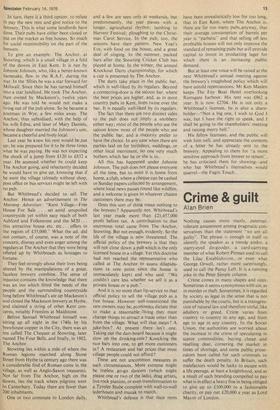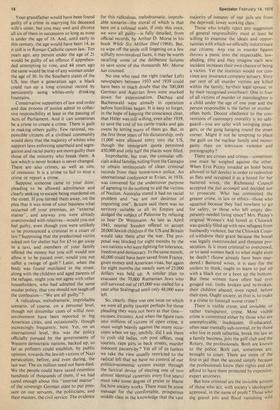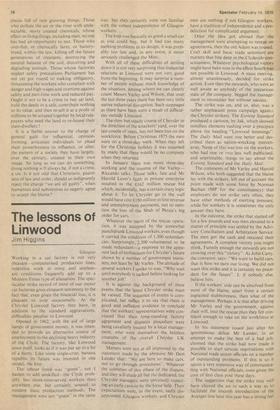Crime & guilt
Alan Brien Nothing causes more manly, paternal. tolerant amusement among pragmatic conservatives than the statement "we are all guilty". The phrase k enough in itself to identify the speaker as a trendy pinko, a starry-eyed do-gooder, a card-carrying member of what Robert Pitman used to call the Lilac Establishman, or even what George Orwell, rather more surprisingly, used to call the Pansy Left. It is a running joke in the Peter Simple column.
Crime comes in many shapes and sizes. Sometimes it seems synonymous with sin, as in murder or theft. Sometimes, it is regarded by society as legal in the sense that is not punishable by the courts, but is a transgression of natural law and therefore sinful, like adultery or greed. Crime varies from country to country in any age, and from age to age in any country. In the Soviet Union, the authorities are worried about the increase in the crime of speculating in scarce commodities, buying cheap and reselling dear, cornering the market in times of shortage, and some public prosecutors have called for such criminals to suffer the death penalty. In Britain, such malefactors would be lucky to escape with a life peerage, at least a knighthood, and as a result of such branding compelled to pay what is in effect a heavy fine in being obliged to give up to £100,000 to a fashionable charity, or pay out £20,000 a year as Lord Mayor of London. Your grandfather would have been found guilty of a crime in marrying his deceased wife's sister, but you may wed and divorce all six of them in succession so long as none is under the age of 16. And, until early in this century, the age would have been 14, as it still is in Roman Catholic canon law. Ten years ago, any person under the age of 21 would be guilty of an offence if apprehended attempting to vote, and 44 years ago the same would be true of any woman under the age of 30. In the Southern states of the US, less than a generation ago, a black could run up a long criminal record by persistently using whites-only drinking fountains.
Conservative supporters of law and order and due process of justice admit to collective responsibility at least in the passing of Acts of Parliament. And it can sometimes be a crime to create a crime. There is guilt in making others guilty. Few rational, responsible citizens of a civilised community would deny that the majority of whites who support laws enforcing apartheid and segregation and racial purity are more guilty than those of the minority who break them. A law which is never broken is never changed. There are also crimes, as well as sins, of omission. It is a crime to fail to stop a crime or report a crime.
Suppose someone came to your door, pleading to be allowed admittance and clearly seeking to escape being murdered on the street. If you turned them away, on the plea that it was none of your business what occurred off your premises, an "external matter", and anyway you were already overcrowded with relatives—would you not feel guilty, even though you were unlikely to be pronounced a criminal in a court of law ? Supposing that the predestined victim asked not for shelter but for ES to get away in a taxi, and members of your family offered the money but you still would not allow it to be passed over, would you not suffer a twinge of guilt ? Later, when the body was found mutilated in the street, along with the children and aged parents of the refugee, might you not agree with other householders, who had adopted the same insular policy, that you should not laugh off the confession—"We are all guilty"?
A ridiculous, melodramatic, imprbbable scenario, of course, on a personal level, though not dissimilar cases of wilful noninvolvement have been reported in big American cities, and occasionally, though increasingly frequently, here. Yet, on an international level, this was the policy officially pursued by the governments of Western democratic nations, backed up, so far as pollsters could establish, by public opinion, towards the Jewish victims of Nazi persecution, before, and even during, the last war. The six million need not have died. We the people could have saved countless hundreds of thousands of them, if we had cared enough about this "internal matter" of the sovereign German state to put pressure on our servants, the politicians, and their masters, the civil service. The evidence
for this ridiculous, melodramatic, improbable scenario—the moral of which is that here on a colossal scale, if only this once, we were all guilty—is fully detailed, from official records, by Arthur D. Morse in his book While Six Million Died (1968). But, to wipe off the smile still lingering on a few wilfully non-involved faces, it may be worth recalling some of the deliberate failures to save some of the thousands Mr. Morse has counted.
No one who read the right (rather Left) newspapers between 1933 and 1939 could have been in much doubt that the 700,000 German and Austrian Jews were marked down for extermination. Dachau and Buchenwald were already in operation before hostilities began. It is easy to forget, in the hope of keeping the conscience clear, that Hitler was still willing, even after 1939, to save the cost of his cattle trucks and gas ovens by letting many of them go. But, in the first three years of his dictatorship, only 11,000 were allowed entry into the US, though the immigrant quota permitted 450,000 and only half the places were filled.
Improbable, but true, the consular officials asked families hiding from the Gestapo to obtain testimonials of clean criminal records from their home-town police. An international conference at Evian, in 1938, was convened for the undercover purpose of agreeing to do nothing to aid the victims of Nazism. Australia stated it had no racial problem and "we are not desirous of importing one". Britain said there was no territory suitable in all its Empire and dodged the subject of Palestine by refusing to hear Dr Weizmann. As late as April 1943, neutral Sweden offered to accept 20,000 Jewish children if the US and Britain would take them after the war. The proposal was blocked for eight months by the two nations who were fighting for tolerance, freedom and democracy. In the same month, 60,000 could have been saved from France, given money and American visas, but again for eight months the measly sum of 25,000 dollars was held up. A similar plan to evacuate the 70,000 Rumanian Jews who still survived out of 185,000 was stalled for a year after Stalingrad until only 48,000 were left.
So, clearly, there was one issue on which we were all guilty (except perhaps for those pleading they were not born at that time— excuses, excuses). And when the figure runs into millions of victims of open crime, it must weigh heavily against the many occasions when we say, tetchily, did I ask them to cosh old ladies, rob post offices, mug tourists, rape girls in back streets, murder innocent passers-by? Yet all of us (unless we take the view usually restricted to the radical left that we have no control of our politico-economic system except through the farcical device of electing one of two almost identical careerists every five years) must take some degree of praise or blame fog how society works. There must be some message for the comfortable, prosperous middle class in the knowledge that the vast
majority of inmates of our jails are from the deprived, lower working class.
Those who totally reject any suggestion of general responsibility must at least be willing to examine the ideals and opportunities with which we officially indoctrinate our citizens. Any rise in murder figures throws a panic into the respectable, lawabiding, elite and they imagine each new incident increases their own chance of being a victim. Yet the statistics would not convince any insurance company actuary. Sixty per cent of all murder victims are killed within the family, brtheir legal spouse, or by their recognised sweetheart. One in four of all victims of murder or manslaughter is a child under the age of one year and the person responsible is the father or mother often both. Decent obedience to the conventions of customary morality is no safeguard—you are safer with swinging strangers, or the gang hanging round the street corner. Might it not be tempting to place the guilt on the nuclear family and monogamy than on television violence and pornography?
There are crimes and crimes—sometimes one must be weighed against the other. When Erin Pizzey invaded an hotel being allowed to fall derelict in order to redevelop as flats and occupied it as a hostel for her battered wives, the Richmond Council accepted the fedi accompli and decided not to prosecute. Who has committed the greater crime, in law or ethics—those who squatted because they had nowhere to go for safety, or those who left empty desperately-needed living space? Mrs. Pizzey's original Women's Aid hostel at Chiswick was quickly filled up with new refugees from husbandly violence, but the Chiswick Council withdrew their grant because the hostel was legally overcrowded and threaten prosecution. Is it more criminal to overcrowd, or to send women back to what might even be death? (Some already have been murdered.) Battered wives, it is easy for the smilers to think, ought to learn to put up with a black eye or a boot up the bottom. But these women have often had eyes gouged out, limbs broken and re-broken, their children abused, even raped, before their eyes. Ought society, us that is, to make it a crime to forestall worse crime?
There is visible crime, and invisible, or rather transparent, crime. Most visible crime is committed either by those who are unemployable, inadequate, ill-educated, often near mentally sub-normal, or by those who live in posh suburbia, break the law as a family business, join the golf club and the Rotary, the professionals. Both are known to the police. Both can, sometimes are. brought to court. There are more of the first in jail than the second simply because the professionals know their rights and can afford to have them protected by expensive, expert attorneys.
But how criminal are the invisible actions of those who act, with society's ideological approval, in the name of profit ? Those who dig gravel pits and flood vanishing wild places full of rare growing things. Those who pollute the air or the river with undetectable, newly created chemicals, whose effect on living things, including man, no one has had an opportunity to test. Those who over-fish, or chemically farm, or batterybreed, w ithin the law, killing off the future generations of creatures, destroying the natural balance of the soil, distorting and degrading animals. Those whose factories neglect safety precautions Parliament has not yet got round to making obligatory, threatening the workers who complain with danger and high wages and overtime against safety and part-time work and reduced pay. Ought it not to be a crime to buy up land, hold the deeds in a safe, contribute nothing to its value, and then re-sell it at a profit of millions to be scraped together by local ratepayers who need the land to re-house their slum-dwellers?
It is a feeble answer to the charge of general guilt for influential, opinionforming, articulate individuals to plead their powerlessness to influence, or alter, the pattern of a society they have largely, over the century, created in their own image. So long as we can do something, doing nothing w'll always be, if not a crime, a sin. Is it not odd that Christians, guardians of law and order, should so indignantly reject the charge "we are all guilty", when humanists and subversives so eagerly agree to accept the blame?




































 Previous page
Previous page